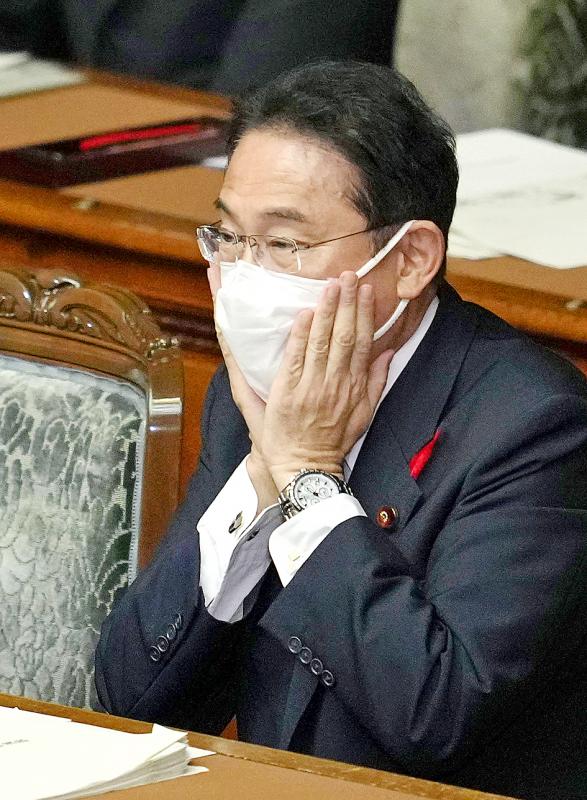In his first policy speech yesterday, new Japanese Prime Minister Fumio Kishida promised to strengthen COVID-19 pandemic management and healthcare in case of another resurgence, and turn around the battered economy while bolstering the nation’s defenses against threats from China and North Korea.
Tasked with the crucial mission of rallying public support ahead of national elections expected on Oct. 31, Kishida promised to pursue politics of “trust and empathy.”
He was elected by parliament and sworn in on Monday as Japan’s 100th prime minister, succeeding Yoshihide Suga, who left after only a year in office. Suga’s perceived high-handed approach to pandemic measures and holding the Olympics, despite rising cases, angered the public and hurt the ruling Liberal Democrats.

Photo: EPA-EFE
“I will devote my body and soul to overcome the national crisis together with the people to pioneer the new era so that we can pass a bountiful Japan to the next generation,” Kishida said.
He promised to be more attentive to public concerns and needs, and prepare COVID-19 measures based on “a worst-case scenario.”
That includes taking advantage of a drop in infections to improve crisis management before the weather turns cold, approving COVID-19 treatment pills by the end of December and digitalize vaccine certificates for use at home as Japan gradually tries to expand social and economic activity, Kishida said.
A former moderate who recently turned hawk on security issues, he said Japan should also increase preparedness for growing regional threats.
He said the security environment has become more severe, and that he would revise Japan’s national security and defense strategy to bolster missile defense capability and naval defense.
“I’m determined to defend our land, territorial seas and air space, and the people’s lives and assets, no matter what,” Kishida said.
The Japan-US alliance remains the “linchpin” of diplomatic and security policies, he said, vowing to further elevate the partnership, which “also serves the foundation of peace and prosperity in the Indo-Pacific region and the entire world.”
Kishida said “establishing a stable relationship with China is important not only for the two countries, but also for the region and the international community.”
Still, Japan, when necessary, will “speak up” against China’s unilateral and coercive activity in the region, while cooperating with other like-minded democracies, he said.
China has become bolder in pursuing its territorial claims in the disputed South China Sea, where it built several artificial islands and turned them into military installations, as well as around the Japanese-controlled East China Sea island of Senkaku, known as the Diaoyutai (釣魚台) in Chinese, which Taiwan and China also claim.
Beijing has also escalated its military activities around Taiwan.
North Korea’s missile and nuclear development cannot be tolerated, but Japan seeks to normalize diplomatic ties with Pyongyang by resolving the “unfortunate [wartime] past,” and the decades-old issue of Japanese citizens abducted to the North, Kishida said.
He reiterated that he is ready to meet North Korean leader Kim Jong-un toward making a breakthrough.

BACKLASH: The National Party quit its decades-long partnership with the Liberal Party after their election loss to center-left Labor, which won a historic third term Australia’s National Party has split from its conservative coalition partner of more than 60 years, the Liberal Party, citing policy differences over renewable energy and after a resounding loss at a national election this month. “Its time to have a break,” Nationals leader David Littleproud told reporters yesterday. The split shows the pressure on Australia’s conservative parties after Prime Minister Anthony Albanese’s center-left Labor party won a historic second term in the May 3 election, powered by a voter backlash against US President Donald Trump’s policies. Under the long-standing partnership in state and federal politics, the Liberal and National coalition had shared power

CONTROVERSY: During the performance of Israel’s entrant Yuval Raphael’s song ‘New Day Will Rise,’ loud whistles were heard and two people tried to get on stage Austria’s JJ yesterday won the Eurovision Song Contest, with his operatic song Wasted Love triumphing at the world’s biggest live music television event. After votes from national juries around Europe and viewers from across the continent and beyond, JJ gave Austria its first victory since bearded drag performer Conchita Wurst’s 2014 triumph. After the nail-biting drama as the votes were revealed running into yesterday morning, Austria finished with 436 points, ahead of Israel — whose participation drew protests — on 357 and Estonia on 356. “Thank you to you, Europe, for making my dreams come true,” 24-year-old countertenor JJ, whose

A documentary whose main subject, 25-year-old photojournalist Fatima Hassouna, was killed in an Israeli airstrike in Gaza weeks before it premiered at Cannes stunned viewers into silence at the festival on Thursday. As the cinema lights came back on, filmmaker Sepideh Farsi held up an image of the young Palestinian woman killed with younger siblings on April 16, and encouraged the audience to stand up and clap to pay tribute. “To kill a child, to kill a photographer is unacceptable,” Farsi said. “There are still children to save. It must be done fast,” the exiled Iranian filmmaker added. With Israel

Africa has established the continent’s first space agency to boost Earth observation and data sharing at a time when a more hostile global context is limiting the availability of climate and weather information. The African Space Agency opened its doors last month under the umbrella of the African Union and is headquartered in Cairo. The new organization, which is still being set up and hiring people in key positions, is to coordinate existing national space programs. It aims to improve the continent’s space infrastructure by launching satellites, setting up weather stations and making sure data can be shared across